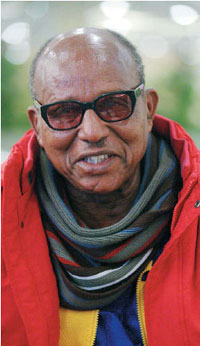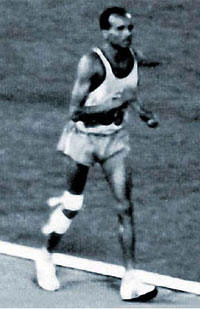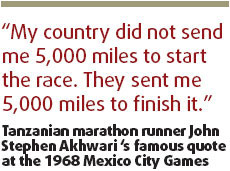It took Tanzania's John Stephen Akhwari 4 hours and 30 minutes to finish the marathon at the 1968 Mexico City Games, a terrible performance by Olympic and African standards but a Herculean effort given that he dislocated his shoulder and tore a hole in his knee midway through.
 John Stephen Akhwari reminisces about his Olympic experience while in Beijing last week. [China Daily]
John Stephen Akhwari reminisces about his Olympic experience while in Beijing last week. [China Daily] |
"My country did not send me 5,000 miles to start the race," he later told Bud Greenspan, who directed the official documentary of the Games. "They sent me 5,000 miles to finish it."
By the time Akhwari approached the finish line, over two hours after winner Mamo Wolde of Ethiopia, the official timekeepers were not even bothering to count the seconds and the awards ceremony was already under way.
When the organizers were told there was still one runner hobbling along the track, however, the news was broadcast on local radio and fans rushed back to cheer him on. The stadium lights were turned back on and Akhwari ran the last 800m to resounding applause.
It was the joint worst performance at the Olympic event - Abdul Baser Wasigi from Afganistan matched his time 20 years later at Atlanta 1996 - but it remains one of the best examples of endurance in the face of adversity at the Games.
The race itself was a tough nut to crack due to its high-altitude location. While the light air on the Mexican Plateau favored events like the javelin, shot put and high jump, the lack of oxygen put endurance runners at a disadvantage.
 Akhwari stumbles to the finishing line during the men's marathon line during the men's marathon at the 1986 Mexico City Games in this file photo.
Akhwari stumbles to the finishing line during the men's marathon line during the men's marathon at the 1986 Mexico City Games in this file photo. |
Altogether, 75 runners showed up for the men's marathon at the Olympic Stadium University, most of them praying for some good fortune from the Mayan gods of yore.
The gods may have smiled on some, but Akhwari, from Mbulu, Tanganyika (formerly a part of Tanzania) was not one of them.
About 19 km into the race, the 30-year-old collided with the middle of the pack and took a bad tumble. With a deep gash in his right knee and his shoulder out of joint, it made little sense to continue, yet he shouldered on and finished last. Eighteen other runners called it quits during the race.
"I just thought about my father and my mother. I just thought about my country," he told China Daily at a Beijing caf last week. "Once I am on the road, there is no way I am going to quit."
Akhwari, who turns 70 this year, was invited to Beijing to celebrate the start of the Olympic year by Games organizers BOCOG. For the interview, he turned up wearing a yellow, blue and green sweater -- the colors of his national flag.
A normal life
Akhwari rarely leaves his hometown in Mbulu. After the Mexico City Games, he returned there and found his fellow villagers were not interested in hearing about his world travels or Olympic feats.
"Jesus created miracles. But what happened to Jesus after that?" he joked.
Two years after appearing at the Olympics, Akhwari finished fifth at the Commonwealth Games in Edinburgh. Ten years later, he retired.

He was awarded a National Hero Medal of Honor in 1983.
He now lives with his wife and six children in a hut made of tree trunks pasted together with mud. His family owns a one-hectare cornfield. They sell some of the corn, and use the rest to make a local porridge-like dish called Ugali.
His home is 7 km from the nearest telephone in the village church. It was there that he received a phone call from Beijing inviting him to the Chinese capital. When he arrived in China, local officials gave him a replica torch of this year's Games as a tribute to his achievements.
"Before the Beijing Olympics starts, I am going to pass the torch to Tanzania, and tell my countrymen that this is China's way of welcoming them to the Games," he said.
Akhwari also starred in a music video for the song "Hero" by Taiwanese singer You Hong Ming during his visit to Beijing. The song will be played on national television during the Olympic Games.
He told local media that he hopes to be invited to watch the Beijing Olympics this summer. Sydney Games organizers received him as a special guest in 2000.
"I hope Beijing and China will host an even greater Olympics. I also wish our Tanzanian athletes the best of luck in Beijing," he said.
"I want to tell the young people in China that they should never give up, that they should always pursue their dreams and face challenges with courage. It doesn't matter if you are a doctor or a teacher or whatever, go for your dream and stick to it," he said.